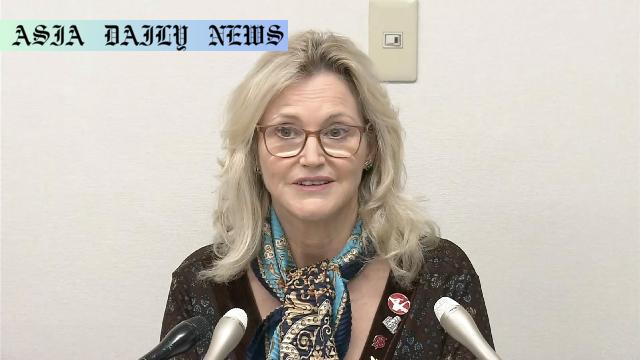Nuclear Weapons: Japan urged to join meetings on UN nuclear weapon ban treaty and provide moral leadership as atomic bombing survivor nation.
ICAN Director Melissa Parke called on Japan to join UN nuclear weapon ban treaty meetings.
Japan, as the only country affected by atomic bombings, has moral leadership to promote a nuclear-free world.
Parke attended Hiroshima and Nagasaki ceremonies marking 80 years after atomic bombings.
She highlighted the ongoing risks and harm caused by nuclear weapons over eight decades.

The Call for Japan’s Moral Leadership in Nuclear Disarmament
The Treaty on the Prohibition of Nuclear Weapons, introduced through concerted global efforts and supported by organizations like the International Campaign to Abolish Nuclear Weapons (ICAN), represents a key milestone in nuclear disarmament advocacy. It calls on nations to reject the production, stockpiling, and use of nuclear weapons, symbolizing a unified effort toward global peace. ICAN Executive Director Melissa Parke, speaking to reporters in Hiroshima, emphasized the critical moral role Japan has to play in this movement. As the only nation to endure atomic bombings during wartime, Japan holds a unique historical and ethical position to lead the world in discussing and endorsing the treaty. The world remembers the devastation wrought on Hiroshima and Nagasaki, but it also looks to Japan as a beacon of hope and resilience. Parke noted that as long as nuclear weapons remain in existence, global safety remains at perpetual risk.
Commemorating 80 Years: Lessons Yet to Be Learned
This year marks the 80th anniversary of the atomic bombings of Hiroshima and Nagasaki, tragic events that changed the course of history. The annual ceremonies held in both cities serve not only as a solemn remembrance of the lives lost but also as a call to action against the ongoing threat posed by nuclear weapons. Parke highlighted the continued suffering of generations affected by the bombings, stating that the harm caused was far from an isolated historical incident. These commemorative events inspire reflection, serving as a reminder that the world—over the past eight decades—has yet to comprehensively address and mitigate the risks tied to nuclear weaponry. The hibakusha, survivors of the bombings, remain vocal advocates for nuclear disarmament, urging leaders like Japan’s Prime Minister Ishiba Shigeru to engage further in global dialogues. Their voices are a moral compass for global leaders, urging a shift away from weapons toward programs of peace and development.
Addressing the Rising Risks of Global Nuclear Conflict
The current heightened risk of nuclear confrontation underscores the urgency of disarmament discussions. Geopolitical tensions fueled by regional conflicts, power struggles among nuclear-armed states, and technological developments in weaponry exacerbate the threat of nuclear usage today. Parke emphasized that humanity’s survival cannot depend on the doctrine of deterrence, as the catastrophic potential of even a single nuclear weapon dwarfs most modern military conflicts. By joining the UN treaty meetings, Japan could provide an indispensable perspective in global discussions. The treaty also creates provisions for victim assistance, addressing the realities faced by hibakusha and their families. Japan’s active participation would highlight its moral leadership and show a commitment to honoring the legacies of those lost while ensuring a safer world for subsequent generations. Parke’s remarks echo the sentiment that peace and safety cannot coexist with nuclear armament, affirming that disarmament is not solely an ethical imperative but a practical necessity.



Commentary
The Imperative Role of Japan in Nuclear Disarmament
The call for Japan to attend UN nuclear ban treaty meetings is both timely and significant, considering its position in history as the only country to have suffered the catastrophic effects of atomic bombings. This unique experience imbues Japan with not just a moral responsibility but also a profound credibility in advocating for the abolition of nuclear weapons. Prime Minister Ishiba and his government must consider how such leadership could shape global disarmament efforts, paving the way for a future free of nuclear threats.
Learning from the Hibakusha
The voices of hibakusha—survivors of the Hiroshima and Nagasaki bombings—are not merely testimonies of historical suffering but also urgent appeals for action. These individuals have vivid, firsthand knowledge of the devastation nuclear weapons can bring, and their stories hold immeasurable value in shaping modern geopolitical decisions. By ignoring these calls, Japan could risk betraying the trust of its own citizens and those who look to it as a leader in peace-building initiatives.
A World at Risk: Why Japan Must Take Action
The ever-increasing risks associated with nuclear armament should concern not just policymakers, but all global citizens. As tensions rise and weapon technologies advance, the possibility of annihilation grows ever nearer. Japan’s active engagement in disarmament treaties would send a firm message that no nation, regardless of its reliance on security alliances, is willing to gamble with the future of humanity. Joining the UN meetings could also rekindle global momentum for nuclear disarmament efforts and inspire other nations to follow suit, proving that moral leadership can indeed spark meaningful change.